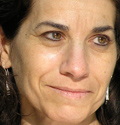
As an expert in localization and sensory networks Deborah Estrin explains what can be learned and shared in the richness of digital traces of activity. She talks about GIS potential for improving commute patterns as well as calculating one's carbon footprint. The ability to corral data and mash up with maps and analytics empowered high school students to accurately estimate and share their carbon impact.
Tracing of individual activity does not just involve automated traces but also experience sampling. A patient's struggle with diabetes and hypertension can yield opportunities to help patients having difficulty with side effects of medications. Self analytics may be prescribed to monitor effects or drug interactions in real-time. This has the potential to prevent a day from being interrupted or lost entirely because of medication challenges.
Estrin contends that the capacity of our pretransactional information to be as private or as public we care top make it has drawbacks that users should be circumspect about. If recordable, thoughts, feelings and their biological indicators, probably should not be stored on a cell phone. Use of secure cloud storage could be effective in managing personal information in educated ways and using best practices.
Deborah Estrin (Ph.D. MIT, 1985; BSEE UCB, 1980) is a Professor of Computer Science at UCLA, holds the Jon Postel Chair in Computer Networks, and is Founding Director of the National Science Foundation funded Center for Embedded Networked Sensing (CENS). CENS’ mission is to explore and develop innovative, end-to-end, distributed sensing systems, from ecosystems to human systems. Estrin’s earlier work addressed Internet protocol design and scaling, in particular, inter-domain and multicast routing. Since the late 90’s her work has focused on multidisciplinary, experimental-systems research as applied to a variety of environmental monitoring challenges. Most recently this work includes participatory-sensing systems, at the personal and community level, leveraging the location, acoustic, image, and attached-sensor data streams increasingly available from mobile phones.
Resources:
This free podcast is from our Where Conference series.
For The Conversations Network:
Photo: Comp Sci Dept-UCLA